| Part of a series on the |
 |
|---|
| |
The following is a list of the members of the 18th Knesset , elected on 10 February 2009.
| Part of a series on the |
 |
|---|
| |
The following is a list of the members of the 18th Knesset , elected on 10 February 2009.
| MK | Party | Replaced | Date | Notes |
|---|---|---|---|---|
| Yulia Shamalov-Berkovich | Kadima | Haim Ramon | 2 July 2009 | Ramon retired from politics to go into business |
| Einat Wilf | Labor Party | Ophir Pines-Paz | 10 January 2010 | Pines-Paz retired from politics |
| Raleb Majadele | Labor Party | Yuli Tamir | 13 April 2010 | Tamir retired from politics |
| Nino Abesadze | Kadima | Tzachi Hanegbi | 9 November 2010 | Hanegbi suspended following indictment |
| Yisrael Eichler | United Torah Judaism | Meir Porush | 6 February 2011 | Porush resigned as part of a seat rotation agreement. |
| Shachiv Shnaan | Labor Party | Matan Vilnai | 14 February 2012 | Vilnai resigned to become ambassador. |
| Doron Avital | Kadima | Ze'ev Boim | 18 March 2011 | Death of Boim |
| Zehava Gal-On | New Movement – Meretz | Haim Oron | 25 March 2011 | Oron resigned his seat |
| Avi Duan | Kadima | Eli Aflalo | 25 January 2012 | Aflalo resigned his seat |
| Yuval Tzelner | Kadima | Tzipi Livni | 3 May 2012 | Livni resigned her seat |
| Akram Hasoon | Kadima | Gideon Ezra | 17 May 2012 | Ezra died of cancer |
| Ahmed Dabbah | Kadima | Avi Dichter | 16 August 2012 | Dichter resigned to become a government minister |
| Alali Adamso | Likud | Yossi Peled | 16 September 2012 | Peled resigned his seat |
| Yoram Marciano | Labor Party | Amir Peretz | 9 December 2012 | Peretz resigned after he left the Labor Party to join Hatnuah |

The Prime Minister of Israel is the head of government and chief executive of the State of Israel.

The Israeli system of government is based on parliamentary democracy. The Prime Minister of Israel is the head of government and leader of a multi-party system. Executive power is exercised by the government. Legislative power is vested in the Knesset. The Judiciary is independent of the executive and the legislature. The political system of the State of Israel and its main principles are set out in 11 Basic Laws. Israel does not have a written constitution.

The Knesset is the unicameral legislature of Israel. As the supreme state body, the Knesset is sovereign and thus has complete control of the entirety of the Israeli government.
Elections in Israel are based on nationwide proportional representation. The electoral threshold is currently set at 3.25%, with the number of seats a party receives in the Knesset being proportional to the number of votes it receives. The Knesset is elected for a four-year term, although most governments have not served a full term and early elections are a frequent occurrence. Israel has a multi-party system based on coalition governments as no party has ever won a majority of seats in a national election, although the Alignment briefly held a majority following its formation by an alliance of several different parties prior to the 1969 elections. Suffrage is universal to all Israeli citizens above the age of 18. Israeli citizens living abroad have to travel to Israel in order to vote. But voting booths are made available on Israeli ships. Elections are overseen by the Central Elections Committee, and are held according to the Knesset Elections Law.
The Cabinet of Israel exercises executive authority in the State of Israel. It consists of ministers who are chosen and led by the prime minister. The composition of the government must be approved by a vote of confidence in the Knesset. Under Israeli law, the prime minister may dismiss members of the government, but must do so in writing, and new appointees must be approved by the Knesset. Most ministers lead ministries, though some are ministers without portfolio. Most ministers are members of the Knesset, though only the Prime Minister and the "designated acting prime minister" are required to be Knesset members. Some ministers are also called deputy and vice prime ministers. Unlike the designated acting prime minister, these roles have no statutory meanings. The government operates in accordance with the Basic Law. It meets on Sundays weekly in Jerusalem. There may be additional meetings if circumstances require it.
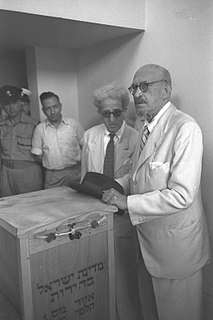
Elections for the second Knesset were held in Israel on 30 July 1951. Voter turnout was 75.1%.
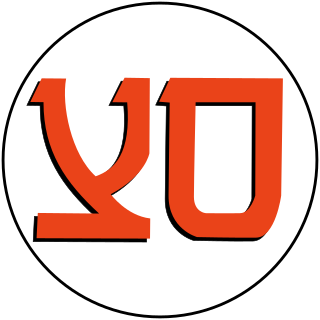
Sephardim and Oriental Communities was a political party in Israel and is one of the ancestors of the Likud party.
Legislative elections were held in Israel on 3 November 1959 to elect the 120 members of the fourth Knesset. Mapai remained the dominant party, gaining seven seats. Following the elections, Mapai leader David Ben-Gurion formed ninth government on 17 December 1959. His coalition included the National Religious Party, Mapam, Ahdut HaAvoda, the Progressive Party and the three Israeli Arab parties, Progress and Development, Cooperation and Brotherhood and Agriculture and Development. The government had 16 ministers. Mapai's Kadish Luz became the Speaker of the Knesset.
Elections for the sixth Knesset were held in Israel on 2 November 1965. Voter turnout was 85.9%.
Yisrael Eichler is an Israeli politician. A member of Agudat Yisrael, he served as a member of the Knesset for the party and the United Torah Judaism alliance from 2003 until 2005, and again since 2011.

Lists of Knesset members cover members of the Knesset of Israel. They are organized by session, by ethnicity and by position.
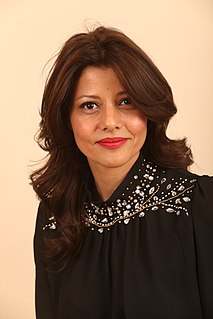
Orly Levy-Abekasis is an Israeli politician who currently serves as a member of the Knesset for Likud. Formerly a model, Levy-Abekasis first entered the Knesset in 2009 as a representative of Yisrael Beiteinu, but left the party in 2017 to sit as an independent. In 2019, she formed her own party, Gesher, to contest the April 2019 elections. Although the party failed to win a seat, she returned to the Knesset following the September 2019 elections, in which Gesher ran together with the Labor Party. In May 2020 she was appointed by Prime Minister Netanyahu as the newly created Minister for Community Empowerment and Advancement.
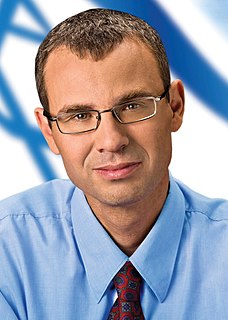
Yariv Gideon Levin is an Israeli lawyer and politician who served as Speaker of the Knesset from 2020 to 2021. He currently serves as a member of Knesset for Likud, He previously held the posts of Minister of Internal Security, Minister of Tourism, and Minister of Aliyah and Integration. On 13 June 2021, he was replaced by Mickey Levy for the position of Speaker.
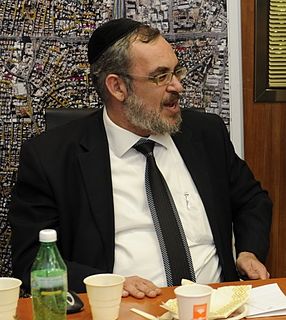
Ya'akov Asher is an Israeli Haredi rabbi and politician who currently serves as a member of the Knesset for the United Torah Judaism alliance. A member of the Degel HaTorah party, he previously served as a member of the Knesset between 2013 and 2015, and was also the thirteenth mayor of Bnei Brak, having taken office in 2008.

Boaz Toporovsky is an Israeli politician. A former chair of the National Union of Israeli Students, he served as a member of the Knesset for Yesh Atid between 2013 and 2015, and has been a member of the Knesset again since 2019. He is currently chair of the Yesh Atid parliamentarly group and vice-chair of the coalition government.
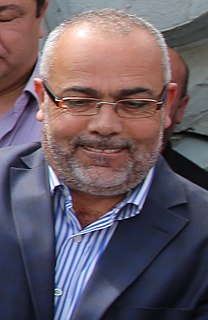
Osama Saadi is an Israeli Arab lawyer and politician. He is currently a member of the Knesset for the Joint List.

Amir Ohana is an Israeli lawyer, former Shin Bet official and politician who currently serves a member of the Knesset for Likud. He previously held the posts of Minister of Justice and Minister of Public Security. He was the first openly gay right-wing member of the Knesset and the first openly gay man from Likud to serve in the Knesset. He is also the first openly gay person to be appointed as a minister in the Israeli government in 2019.

Yulia Malinovsky is an Israeli politician and lawyer. She is currently a member of the Knesset for Yisrael Beiteinu.

Yinon Azulai is an Israeli politician. He is currently a member of the Knesset for Shas.